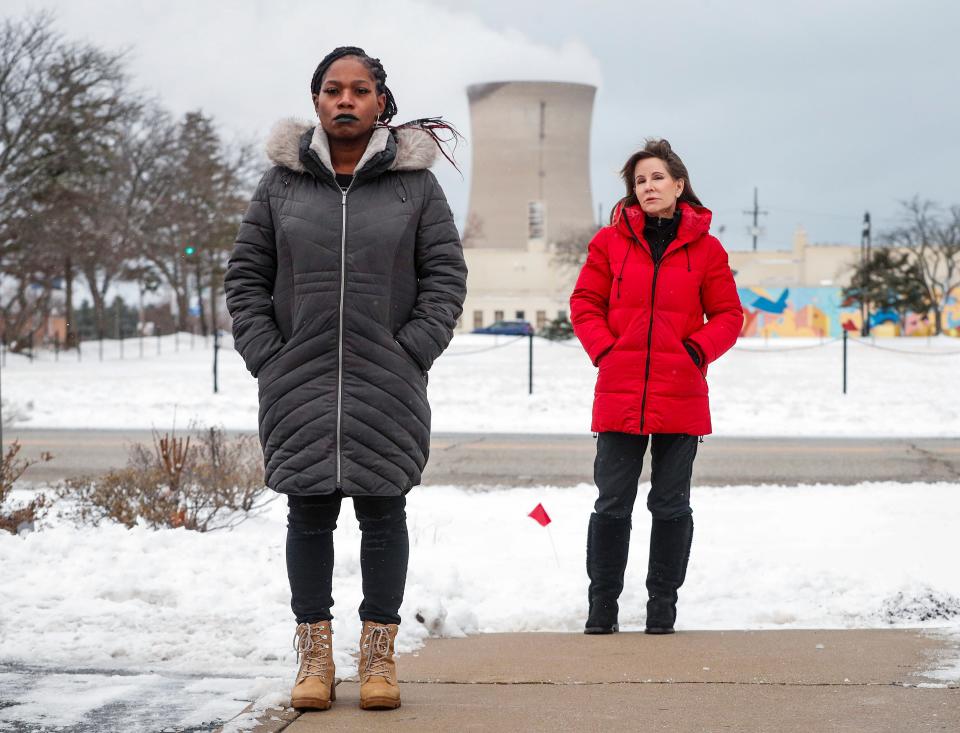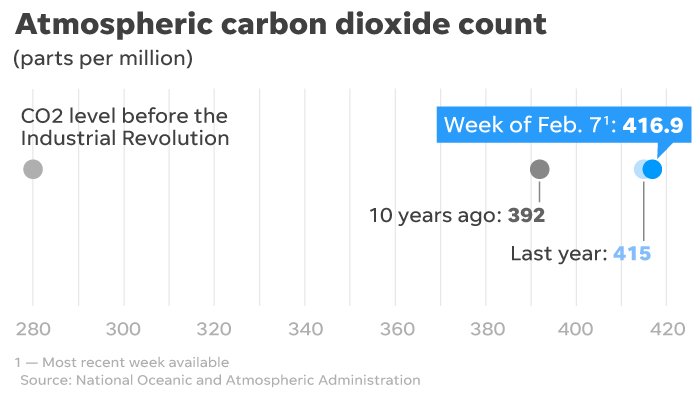Climate Point: Republicans try to shift blame for Texas energy woes to renewables
Welcome to Climate Point, your weekly guide to climate, energy and environment news from around the Golden State and the country. In Palm Springs, Calif., I’m Mark Olalde.
Is it possible for anything to be apolitical these days? It wouldn't seem like that's possible. First, my thoughts go out to everyone suffering in Texas where power has been out for days in some areas, while temperatures have plummeted. Second, this means we need to discuss energy policy.
Prominent Republicans — from Texas Gov. Greg Abbott to Texas Rep. Dan Crenshaw — have latched onto their own state's deadly power outages to take aim at renewable energy, igniting a seething debate over energy policy. Instead of repeating their false statements, however, I'm going to use this space to share analyses about what really happening to the Lone Star State's grid.
Let's start with the Houston Chronicle, which reports that Texas was warned a full decade ago that a perfect storm had hit before and would hit again because electricity infrastructure wasn't weatherized. Now, climate change is only making extreme weather more extreme. Meanwhile, Madlin Mekelburg of the Austin American-Statesman found that at least a third of the board that controls Texas' grid doesn't even live in state. And, Bloomberg writes that, while some wind turbines went offline due to the cold, "frozen instruments at natural gas, coal and even nuclear facilities, as well as limited supplies of natural gas," were much bigger problems. In fact, Abbott went as far as temporarily banning the sale of Texas natural gas outside the state. So much for a free market.
Finally, got questions on the science behind the polar vortex that brought this extreme freeze? USA Today has you covered with this helpful visualization.
Here's some other important reporting. ...

MUST-READ STORIES
Unprecedented. A highly contaminated, 1,400-acre site in Philadelphia might have a second life as real estate, but first it'll have to go through a decade of cleanup that will cost hundreds of millions of dollars, Reuters reports. The defunct oil refinery's costly transition provides "a glimpse of what lies ahead if the United States hopes to wean itself off fossil fuels and clean up the toxic legacy of oil, gas and coal," they write. There are about 135 such refineries scattered across the country, with at least six others announcing in recent months that they were scheduled to shut their doors for good. Whatever comes next can redefine the cities they once polluted.
Rolling back the rollback. The Biden administration has begun in earnest the process of doing away with the Trump administration's attempts to roll back environmental laws. The latest move comes in the California desert, where the U.S. Department of the Interior announced Wednesday that it will cancel an 11th-hour action by the previous administration to rewrite the Desert Renewable Energy Conservation Plan. The agreement spans more than 10 million acres and tries to balance solar, wind, mining, cultural resources and desert habitat. I've got the story for The Desert Sun.
Indiana's time bomb. Over in the Hoosier State, Sarah Bowman of the Indianapolis Star writes that "ash from Indiana's coal-burning power plants is contaminating groundwater across the state, rendering it unsafe to drink." But, while some states are forcing utilities to transfer the carcinogenic waste to lined pits, Indiana's got the most coal ash-filled pits of any state in the nation and is letting them sit there. Water near 14 power stations is already contaminated as a result.

POLITICAL CLIMATE
Waging water wars. The Sacramento Bee and the Guardian partnered on a recent piece digging into court documents that detailed the Trump administration's efforts on California water policy. They uncovered numerous exchanges between government regulators who said science was being sidelined as a 2019 water deal appeared to favor farmers over environmental concerns. Agricultural interests have said the state had been wasting water, but a California Democratic member of Congress called some of the findings "blatantly illegal."
Fracking fracas. The Desert Sun's very own Janet Wilson reports that California progressives are turning up the heat on fracking and other controversial drilling methods. Two state senators introduced a bill this week to "halt all new fracking, steaming and other risky oil and gas production techniques next year, and end them completely by 2027." The ambitious, proposed legislation also seeks to institute a nearly half-mile buffer zone between oil and gas development and residential areas.
This story's charged. HuffPost is out with the details on a piece of international controversy brewing in Georgia. The U.S. International Trade Commission has blocked "one of the world's biggest electric vehicle battery manufacturers from selling its cells in the United States" over a charge that it stole trade secrets. Ford and Volkswagen had already designed electric vehicles around the specific battery the company was to produce, throwing a significant wrench in the rollout of cleaner cars in the U.S. Biden has 60 days to either veto the decision or let it stand.
GRAB BAG
Either the environment news has come hard and fast this week or I've just been unable to focus my attention on one topic. Either way, there's too much interesting stuff to share, so let's take a wide-ranging look, rapid-fire style.
Wildfires. The AP reports that a U.S. Energy Department inspector general audit found wildfire risk was increasing around Los Alamos, a nuclear laboratory in New Mexico, but the operation isn't taking enough precautions.
Abandoned mines. KUTV, a CBS affiliate in Salt Lake City, reports that the U.S. Environmental Protection Agency awarded $220 million in contracts for long-awaited reclamation at abandoned uranium mines scattered across the Navajo Nation.
Ecosystems. CNN reports that scientists accidentally discovered "strange life forms on a boulder beneath the ice shelves of the Antarctic," including sponges and some other species that might be yet-uncategorized.
Wave energy. KTVZ in Oregon reports that the Bureau of Ocean Energy Management, which typically deals with offshore oil and gas production, awarded a lease to Oregon State University for the first wave energy research project. It will look at technology to harness waves as renewable energy.
EVs. USA Today reports that luxury car brand Jaguar will, in 2025, start shifting to selling only electric vehicles, with the majority of Land Rover sales also expected to be electric by 2030.
Biodiversity. Audubon, a wildlife-focused magazine, reports that the Mojave Desert has gotten about 3.6 degrees Fahrenheit hotter and lost 20% of its rainfall in some areas over the past 100 years, meaning that bird species there are pushed to the brink due to climate change.
AND ANOTHER THING

Red rover. And finally, I promised you more space news, so here we are. Emre Kelly at Florida Today has the latest on the Perseverance Mars rover landing, which is taking place today. After traveling nearly 300 million miles, three spacecraft from three different countries are all arriving at the red planet this month. Perseverance now needs to slow itself down from 12,100 mph to 1.7 mph during its "fiery, seven-minute atmospheric entry and touchdown." My fingers are crossed for this $2.4 billion mission, although I'm far from the only one. Krispy Kreme tweeted at the rover, asking for suggestions of good locations for a doughnut shop. I don't yet know what to make of that...
Scientists agree that to maintain a livable planet, we need to reduce the atmospheric carbon dioxide concentration back to 350 ppm. We’re above that and rising dangerously. Here are the latest numbers:

That’s all for now. Don’t forget to follow along on Twitter at @MarkOlalde. You can also reach me at molalde@gannett.com. You can sign up to get Climate Point in your inbox for free here. If you’d like to receive a daily round-up of California news (also for free), you can sign up for USA Today’s In California newsletter here. And one more steal of a deal this week: 6 months of Desert Sun access for only $1! Give a hoot; mask up. Cheers.
This article originally appeared on USA TODAY: Climate Point: Republicans try to shift blame for Texas energy woes to renewables

